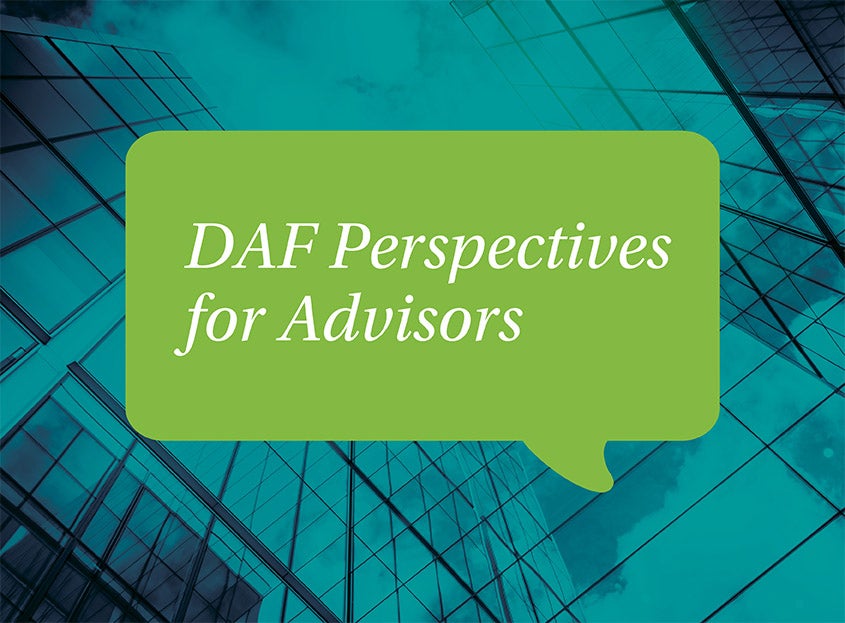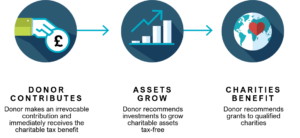Donor-Advised Funds: FAQs for Private Client Advisors

Your clients may increasingly be using DAFs as an alternative to setting up their own charitable trust or foundation. Here are some of the most frequently asked questions about how DAFs can help private client philanthropy:
What is a DAF?
A donor-advised fund is a philanthropic fund established under an umbrella charity, like NPT UK, that administers the fund on behalf of a donor.
How does a DAF work?
A DAF allows donors to make charitable contributions to the DAF account by donating cash or appreciated assets, receive immediate tax benefits, and then recommend grants from the DAF account to charities anywhere in the world over time. Donors receive UK tax relief for each contribution to their DAF account.

Why are private clients choosing DAFs over other philanthropic structures?
DAFs offer several benefits over other philanthropic structures:
Ease of set up: Because DAFs are administered by an umbrella charity, they can be established quickly. Once a completed Donor Advised Fund Application is complete, a DAF can usually be established and ready to receive contributions within 48 hours. There is no cost to setting up the DAF.
Ease of use: NPT UK assumes all regulatory and reporting responsibilities so your clients can focus on their giving.
Flexibility: Your clients can contribute a wide range of assets to their DAFs and can also use their DAFs to make grants to charities anywhere in the world. NPT UK takes care of the charity due diligence and grant processing.
Recognition or anonymity: Your clients may make grants anonymously from their DAFs if they wish or use their DAFs publicly for recognition.
Online access: donors and advisors to the DAF may view their account online to make investment and grant recommendations.
When should my clients set up a DAF?
Your clients may set up DAFs for different reasons. Here are some of the most common situations when a DAF might be the right solution.
Moving from cheque book giving to more strategic long-term giving: There comes a point when donors want to move from ad hoc charitable donations to more sustained giving. Setting up a DAF allows donors to set aside philanthropic capital and invest it if they wish. They can then grant to charities at any time.
Making the most of a wealth event: Many donors will set up or add funds to a DAF when a significant liquidity event occurs, such as an initial public offering, bonus or inheritance. This allows immediate tax relief but gives them breathing room to consider how best to distribute their giving over time.
Engaging the next generation: Many families use charitable giving to engage the next generation in the responsibility of wealth. As wealth is transferred, your clients may want to include their family in their philanthropic activities as a way to pass on family values and share the experience of philanthropic giving. A DAF offers a flexible solution that can allow the next generation to develop their own giving strategy. A DAF can also be passed on through generations.
What types of assets can my clients contribute to a DAF?
DAFs accept a wide range of assets. These include cash, publicly traded securities including stocks, bonds, mutual funds, OEIC shares, restricted and controlled stock, privately held stock, property, art, and cryptocurrency. A DAF may also be named a beneficiary of a bequest under a will or trust or designated as beneficiary of a life insurance policy or pension plan.
Your clients may claim income and capital gains tax relief when they give charitably. Charitable contributions may also be eligible for Gift Aid in the UK. Your clients can use offshore trusts and other fiduciary structures to make contributions to their DAFs. NPT UK will accept these contributions offshore.
Can my clients appoint investment managers to manage the DAF assets?
Yes. For DAF with balances over £500,000 your clients may appoint the investment manager of their choice, including impact investment managers.
Can my clients make grants to charities globally?
Your clients can use their DAFs to recommend grants to charitable organisations anywhere in the world. NPT UK undertakes due diligence on charitable recipients for every grant recommendation. For international charities, NPT UK carries out enhanced due diligence to determine a charity’s eligibility to receive a grant. Depending on the time needed by the grantee to return the due diligence, it generally takes from two to four weeks to fully process and pay out a grant.
When are DAFs not suitable?
If your clients are looking to establish their own operational charity and employ staff to deliver a charitable programme, they will need to establish their own legal charitable entity. In addition, the DAF cannot make grants to individuals or to political parties. Grants cannot be used for any personal benefit, such as school fees, tickets to attend an event, some membership fees or any goods purchased at a charitable auction.
To find out more about how NPT UK can support your clients’ philanthropy, please contact us.
NPT UK does not provide legal or tax advice. This blog post is for informational purposes only and is not intended to be, and shall not be relied upon as, legal or tax advice. The applicability of information contained here may vary depending on individual circumstances.


